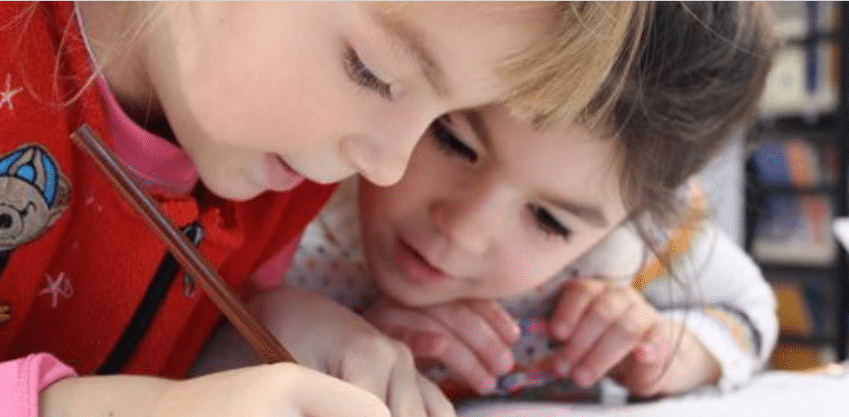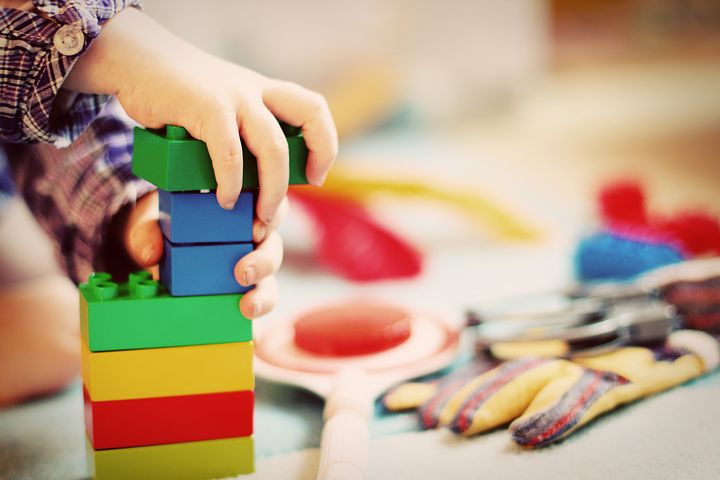Wow, your child probably has recently started Kindy or will be about to embark on this exciting and equally daunting new life adventure. What an exiting time for all of you, as your child continues to sponge up everything around him / her!
Today we talk about helping your school-aged child to develop milestones that will help them flourish throughout their schooling years and on towards life.
If you find your child is not hitting many of his / her three-year old milestones, you may want to visit our previous post that discusses how to help a three year old.

Please remember all children develop at their own pace. This post is designed to help your child, if you do have any concerns. It may also be helpful for parents who are out of ideas on how to continue to help develop language skills.
Here are some of the key skills that we look for in children by the time they turn four:
Receptive Language
Receptive language is the ability to understand words and language. It involves understanding words, sentences and meaning of what is said or read. Receptive language is a key foundation skill of overall language development. Children with receptive language delay can have difficulties at home, school and at work.
Target |
How you can help your child |
|---|---|
|
Follow 3 step instructions (e.g. get the ball, give it to |
Give your child opportunities to follow 3-step instructions. Ask your child to help set the dinner table, unload the dishwasher, etc. Provide unusual instructions during these tasks e.g. ‘clap your hands, put a spoon away and then give me a high 5’. Your pre-schooler should be able to follow the complete instruction, in the correct order. You should be able to provide the instruction all at once rather than pausing while each step is completed. |
|
Understand more concepts (e.g. heavy, light, short, tall) |
Continue to develop your child’s understanding of concepts through increased exposure and by explaining what the concepts mean. |
|
Understand colour & shape names |
Play games that require your child to sort objects based on colours and shapes. Each time, name the colour and encourage your child to name the shape / colour. |
|
Can sort objects / pictures into categories |
Group objects into categories e.g. clothes, food, animals, vehicles, furniture, etc. You can use junk mail, toys, real objects or printed pictures. Also talk about the features of the objects: sounds; colours; how you use them; where you find them. Ask your pre-schooler to find the picture or object that does not belong. For example, a dog does not belong with the vehicles because it is an animal. |
|
Understand “why”, “how”, & “how many” questions |
Talk about why and how things happen. For example, when driving to school, ask your pre- schooler why you stopped at the red light; what might happen if you didn’t’ stop; how would a cyclist feel if he had an accident; etc. Please feel free to contact me for more specific questions. |

Having fun is instrumental in facilitating learning. Chatterbox delivers therapy in a fun, engaging manner.
Expressive Language
Expressive language refers to the child’s ability to generate language to communicate their needs and wants. It involves the use of gestures, words, sentences and writing to interact with others. Research shows a strong link between receptive and expressive language abilities, and a child’s later development of literacy skills.
Target Skill |
How you can help your child |
|---|---|
|
Use lots of words, about 900, usually in four to five-word sentences |
Support your child’s language development by adding one more key word. For example: Child: big yellow lion Children are expected to use a range of descriptive words to convey shape, size, texture. |
|
Use correct grammar with occasional mistakes, such as |
Ensure you are always using correct grammar. Don’t make a big deal of any errors – just say the sentence back with the correct grammar. For example: Child: look, I jump |
|
Use connector words such as ‘because’ and ‘but’ to make longer sentences |
As, above, model the use of these word types, emphasising the joining word. For example: Child: I have a banana. I have apple. Be mindful of your pre-schooler over-using a joining word e.g. ‘ I went to the zoo. And I saw the monkey. And then I had lunch. And we went home. And it was so much fun.) or using an incorrect joining word (e.g. I ate a pear so I am hungry). |
|
Ask many questions, usually ‘what’ or ‘who’ questions |
Encourage your child to ask questions and respond to them appropriately. |
|
Tells stories about a topic |
Pick a range of topics and make up stories with each other. At this age, children are expected to have some sequence in the story but no plan. |

So much to talk about…
Some more tips for expressive language
Target Skill |
How you can help your child |
|---|---|
|
Speak clearly enough to be understood by most people |
Clarity can be impacted by a number of factors including sound errors, a child’s volume being too soft and / or children talking too fast. If volume or speed are issues, encourage your pre-schooler to adjust their rate or volume accordingly. Feel free to contact me for a fun visual sheet that can help children understand these concepts better. |
|
Use a range of sounds in words: p, b, m, t, d h, w, n, y, k, g, ng, f, l, s, z, sh |
Your pre-schooler should be correctly using most of these sounds in different positions (start, middle, end) within a word. Some errors are considered to be age-appropriate whilst other are not developmental. If unsure, please contact a speech pathologist to get a sense of whether there is a need for concern. Always say words back correctly to your pre- schooler and do not put pressure on him / her to repeat the word/s. |
|
Play is imaginative and involves the use of language |
Ensure your pre-schooler has toys that enable play and language development. Pretend play toys (e.g. tea sets, doctor’s kit, dress-ups, Duplo blocks, etc) are all great ways to expand a toddler’s imagination, while developing their play and language skills. Play with your child and demonstrate how the toys can be used to pretend. |
General Strategies
- Consider a hearing test, especially if your child is difficult to understand.
- Make silly sentences using pictures. For example, put a cat on the seesaw and make up a sentence about the picture. Discuss what’s funny about this picture and discuss things such as what might happen to the cat; why this situation is un/likely to occur; etc.
- Read books with your pre-schooler. Talk about the story with your child. Help him / her retell the story, or act it out. Talk about your favourite part/s of the story and discuss why. Don’t be afraid to deviate from the words of the book – get creative and generate your own stories based on the pictures. Talk about how the story might end / start differently.
- Ask open-ended questions that will encourage your child to use longer sentences. For example, rather than ‘did you go swimming?’, ask “where did you go today?”
- Encourage your pre-schooler to engage in pretend play such as going to the dentist. Use dress-ups to make it fun.
- Help develop your child’s pre-literacy skills by discussing how words rhyme and playing rhyming games. Talk about the sound that a word starts with (yup, you guessed it – a dose of ‘I spy with my little eye’…).

Lego is a favourite for so many children at this age and is great for developing imagination and language skills.
You may want to seek professional input from a speech pathologist if your child:
- Is difficult to understand by other people
- Demonstrates limited or no use of grammatical elements (e.g. verb endings ‘ed’ and plurals)
- Is unable to give a clear account of an event that occurred while you were not present (e.g. tell about a school excursion)
How we can help:
If you find these strategies are not helping your child progress, you may want to contact a speech pathologist. At Chatterbox Speech Pathology, based in Stirling, we can provide lots of practical strategies to help support language development. Our assessments provide insightful information about the things your little one is great at and areas that we can support. We make therapy fun for the child and give parents realistic goals to consolidate at home with practical ideas on how to develop the goals. We provide parent coaching to increase your ability to support your child.
If you would like any further information, please feel free to contact Kunali on 0405 176 931 or Email me.
I hope you have found some useful information about getting your four year old chatting away. Next week, we will discuss what to do for your five year old. Have a super happy week!





